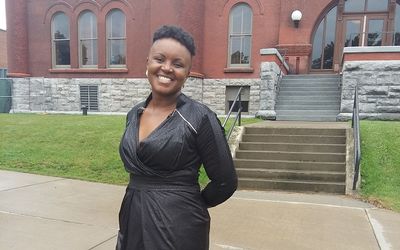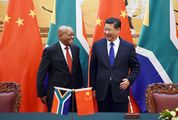IT’s not easy commuting more than 150km to get to school every day. For Zibu Mthiyane, it required leaving home at 4.45am to catch a 5am bus and returning home at 5.45pm. "Growing up in a location, you don’t dream of becoming something, so I never had real or tangible dreams," she says of her upbringing in Eshowe.
"I was not exposed enough to the world or to myself."
Although she successfully completed high school, her parents didn’t have money to register her at university. Her father had been retrenched from his job at a mine two years before she matriculated and her education policy was cashed in to feed the family.
In 2000 she was "initiated into the brutal reality of being black, female, and poor in SA", Mthiyane recalls.
"I spent the year working as a temporary teacher in a rural school earning R800 and using R200 to travel to work.
"I resigned after Easter and worked as a domestic worker with better pay and no travelling and also did hair on a part-time basis."
One of her clients was a student at Nongoma Technical College who told her that registration fees there were R500. A week later she quit her job to enrol for a national diploma in Public Relations.
She later took inspiration from one of her teachers, a student at the University of Zululand, and fundraised for a BA in Communication Science and Information Technology.
"She said it’s for people who like to talk," Mthiyane says.
"I knew no better, but I knew I was a good communicator."
She later did an MBA at the University of Stellenbosch Business School. She went in expecting it to be six mainstream modules with assignments and exams she would be good at, but she found the experience challenging on a deeper level.
"I wasn’t ready for the leadership development journey," Mthiyane says.
"I wasn’t ready to examine my life, question my frames of reference, and understand how they colour my perceptions. I wasn’t ready to acknowledge the internalised oppression that made me prejudge interactions with white colleagues differently from those with black colleagues," she says.
"But the MBA was growth for me. I got much more value than I paid for. I think it’s Socrates who said that an unexamined life is not worth living; I had not examined my life until orientation week."
...
MTHIYANE says she cannot overstate the importance of education in her life. At a personal and professional level, she says life before the MBA is "almost unrecognisable" when compared to life afterwards.
Her ability to articulate and defend her positions grew immensely, and she realised how much business was lost though miscommunication.
"My MBA made me question everything — what I believed about race relations in SA, how I perceived entrepreneurship, and business’s role in society."
This knowledge and skill is proving helpful in her role as founder and CEO of Zoluhle Polymerics, a company that specialises in designing and manufacturing synthetic steel products.
"I was working within the energy industry and I was therefore best placed to see where SA was going in terms of energy availability," she says.
"Zoluhle was initially an energy consulting and development planning company but it evolved as I started to investigate the real energy crisis."
Mthiyane says her greatest professional achievement is leading the rural electrification programme for KwaZulu-Natal.
It allowed her to mentor young engineers to realise their role, not just in the industry, but in society at large, she adds.
Mthiyane says she experienced what "instant gratification" is like when the lights in the houses went on.
She was selected for US President Barack Obama’s Young African Leaders Initiative this year after a rigorous interview process.
"I am proud that once again I got to fly the South African flag internationally and to showcase the capacity available in rural women," Mthiyane says.
"I got to illustrate what is possible in our society when young girls are given an opportunity to stay in school and the support and mentoring that opens their minds to what is possible."
In addition to the "huge and overwhelming honour" of being recognised as a future leader of the country and a major player on the continent, Mthiyane was thrilled to meet Obama. She describes it as a yet another life-changing moment and confirmation that her dreams are valid and deserve pursuit.
"It was the first time I believed, without a shadow of a doubt, that my greatest fear is that I might be powerful beyond measure," she says. "It was an incredibly revealing day."
Looking ahead, Mthiyane wants to grow the advanced composites industry in Africa because she refuses to allow the continent to continue importing what can be produced cheaper at home. By bringing innovation and insights into the sector, she also wants to demonstrate that transformation can be good for everyone in the industry.
"Look closer to home for your markets," she advises. "Africa has established itself as a growth frontier for almost all industries and products. Its consumer markets are growing faster than any other continent."
Beyond this, she wants to use her life as an inspiration for young girls. This is why she often goes back to her community — so that today’s generation can dream of one day becoming like her.
"I overcame poverty by focusing on what was possible," she says. "I learned that what you feed grows, so if I feed anxiety and fear it will grow. But when I let my dreams, aspiration, and hope take their fill in my mind, I can move mountains."

Zibu Mthiyane, CEO of Zoluhle Polymerics, credits rising to the top of the corporate world with doing an MBA. She was selected for US President Barack Obama’s Young African Leaders Initiative this year. Picture: SUPPLIED
IT’s not easy commuting more than 150km to get to school every day. For Zibu Mthiyane, it required leaving home at 4.45am to catch a 5am bus and returning home at 5.45pm. "Growing up in a location, you don’t dream of becoming something, so I never had real or tangible dreams," she says of her upbringing in Eshowe.
"I was not exposed enough to the world or to myself."
Although she successfully completed high school, her parents didn’t have money to register her at university. Her father had been retrenched from his job at a mine two years before she matriculated and her education policy was cashed in to feed the family.
In 2000 she was "initiated into the brutal reality of being black, female, and poor in SA", Mthiyane recalls.
"I spent the year working as a temporary teacher in a rural school earning R800 and using R200 to travel to work.
"I resigned after Easter and worked as a domestic worker with better pay and no travelling and also did hair on a part-time basis."
One of her clients was a student at Nongoma Technical College who told her that registration fees there were R500. A week later she quit her job to enrol for a national diploma in Public Relations.
She later took inspiration from one of her teachers, a student at the University of Zululand, and fundraised for a BA in Communication Science and Information Technology.
"She said it’s for people who like to talk," Mthiyane says.
"I knew no better, but I knew I was a good communicator."
She later did an MBA at the University of Stellenbosch Business School. She went in expecting it to be six mainstream modules with assignments and exams she would be good at, but she found the experience challenging on a deeper level.
"I wasn’t ready for the leadership development journey," Mthiyane says.
"I wasn’t ready to examine my life, question my frames of reference, and understand how they colour my perceptions. I wasn’t ready to acknowledge the internalised oppression that made me prejudge interactions with white colleagues differently from those with black colleagues," she says.
"But the MBA was growth for me. I got much more value than I paid for. I think it’s Socrates who said that an unexamined life is not worth living; I had not examined my life until orientation week."
...
MTHIYANE says she cannot overstate the importance of education in her life. At a personal and professional level, she says life before the MBA is "almost unrecognisable" when compared to life afterwards.
Her ability to articulate and defend her positions grew immensely, and she realised how much business was lost though miscommunication.
"My MBA made me question everything — what I believed about race relations in SA, how I perceived entrepreneurship, and business’s role in society."
This knowledge and skill is proving helpful in her role as founder and CEO of Zoluhle Polymerics, a company that specialises in designing and manufacturing synthetic steel products.
"I was working within the energy industry and I was therefore best placed to see where SA was going in terms of energy availability," she says.
"Zoluhle was initially an energy consulting and development planning company but it evolved as I started to investigate the real energy crisis."
Mthiyane says her greatest professional achievement is leading the rural electrification programme for KwaZulu-Natal.
It allowed her to mentor young engineers to realise their role, not just in the industry, but in society at large, she adds.
Mthiyane says she experienced what "instant gratification" is like when the lights in the houses went on.
She was selected for US President Barack Obama’s Young African Leaders Initiative this year after a rigorous interview process.
"I am proud that once again I got to fly the South African flag internationally and to showcase the capacity available in rural women," Mthiyane says.
"I got to illustrate what is possible in our society when young girls are given an opportunity to stay in school and the support and mentoring that opens their minds to what is possible."
In addition to the "huge and overwhelming honour" of being recognised as a future leader of the country and a major player on the continent, Mthiyane was thrilled to meet Obama. She describes it as a yet another life-changing moment and confirmation that her dreams are valid and deserve pursuit.
"It was the first time I believed, without a shadow of a doubt, that my greatest fear is that I might be powerful beyond measure," she says. "It was an incredibly revealing day."
Looking ahead, Mthiyane wants to grow the advanced composites industry in Africa because she refuses to allow the continent to continue importing what can be produced cheaper at home. By bringing innovation and insights into the sector, she also wants to demonstrate that transformation can be good for everyone in the industry.
"Look closer to home for your markets," she advises. "Africa has established itself as a growth frontier for almost all industries and products. Its consumer markets are growing faster than any other continent."
Beyond this, she wants to use her life as an inspiration for young girls. This is why she often goes back to her community — so that today’s generation can dream of one day becoming like her.
"I overcame poverty by focusing on what was possible," she says. "I learned that what you feed grows, so if I feed anxiety and fear it will grow. But when I let my dreams, aspiration, and hope take their fill in my mind, I can move mountains."





















